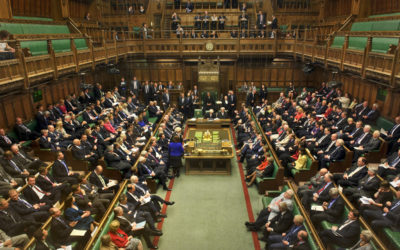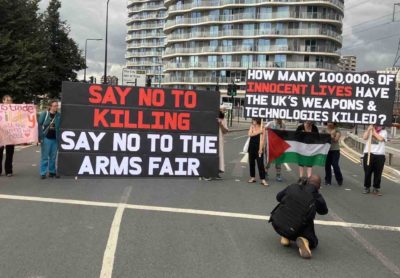Imprisoned Navy conscientious objector to appeal conviction in High Court
ForcesWatch press release
Navy medic Michael Lyons, a conscientious objector convicted of disobedience, who was detained in July, stripped of his rank and dismissed from the service, will be at the High Court 13 October to appeal his conviction. A recent European ruling recognises conscientious objection for first time as human right.
Recent European ruling recognises conscientious objection for first time as human right
A medic in the Royal Navy who was detained at court martial in July this year will appeal his conviction at the High Court on Thursday 13 October.
Michael Lyons was convicted of “wilful disobedience” because he asked not to participate in rifle training last September as he had applied for conscientious objector status. He was given 7 months detention, stripped of his rank as Leading Medical Assistant and dismissed from the service. (2)
At Michael Lyons’ court martial his lawyer argued that, because he had already applied for discharge as a conscientious objector at the time of the training, the command for him to participate in it was unlawful. Furthermore, as a medic and non-combatant, Mr Lyons had not been required to handle a weapon since 2005 and is not required to under the Geneva Convention.
Shortly after Mr Lyons was convicted, a ground-breaking ruling was made by the European Court of Human Rights which could have significant impact on this and similar cases. The ECHR ruled that states have a duty to respect individuals? right to conscientious objection to military service as part of their obligation to respect the right to freedom of thought, conscience and religion set out in Article 9 of the European Convention on Human Rights. (3)
Michael’s wife Lillian, said of her husband, who is now detained at the Military Corrective Training Centre at Colchester, “I am so proud of my husband, he is the most compassionate, kind, loving and moral man I have ever known. I agree with everything he has done, and I am appalled by the way the Navy have treated him.”
ForcesWatch, a network concerned with ethical issues around the armed forces, said the case highlights the lack of respect shown for the human rights of forces personnel. Emma Sangster, Co-ordinator of ForcesWatch, said:
“There are a number of significant concerns about the way that Michael Lyons’ case has been handled – within the chain of command, by the committee that dismissed his claim to conscientious objection as ‘political’ and in the conclusions of the court martial (4,5,6). In passing sentence, the judge questioned Michael’s sincerity although no evidence to question this was brought before the hearing. On the contrary, Michael’s immediate commanding officer did not block his application.
“It is quite clear that Michael’s awareness and conscience have developed significantly since he enlisted aged 18. He joined up because he was sold the story that, as a member of the Navy, he would be offering humanitarian aid to people who needed it. Michael has been extremely courageous to act on his conscience and remain consistent and dignified throughout this whole process.
“The simple injustice of Michael’s treatment illustrates how the government and the Ministry of Defence repeatedly fail to recognise conscientious objection in practice. We hope the recent recognition given to those who object on moral grounds to military service by the European Convention on Human Rights will create a change of attitude in the UK armed forces.”
ENDS
Details of appeal: 10.30am, Thursday 13 October 2011, Royal Courts of Justice, Strand, London
NOTES
1. ForcesWatch is a network launched in 2010 concerned with ethical issues around armed forces recruitment and the rights of forces personnel.
2. Navy medic sentenced to seven months in military correction centre for disobeying orders
British Forces News, 6 July 2011
http://bfbs.com/news/afghanistan/navy-medic-sentenced-seven-months-military-correction-centre-disobeying-orders-49316.htm
3. European Court of Human Rights affirms the right to conscientious objection to military service
Joint statement of Amnesty International, Conscience &Peace Tax International, International Commission of Jurists, Quaker United Nations Office, Geneva, and War Resisters’ International
http://www.wri-irg.org/node/13272
In the case of Batayan v Armenia, the ECHR found that the imprisonment of a Jehovah’s Witness, for his refusal to perform military service at a time when no civilian alternative was available, was a violation of his rights under Article 9 of the European Convention on Human Rights that protests the right to freedom of thought, conscience and religion.
Paragraph 110 of the judgment states, “the Court notes that Article 9 does not explicitly refer to a right to conscientious objection. However, it considers that opposition to military service, where it is motivated by a serious and insurmountable conflict between the obligation to serve in the army and a person’s conscience or his deeply and genuinely held religious or other beliefs, constitutes a conviction or belief of sufficient cogency, seriousness, cohesion and importance to attract the guarantees of Article 9.”
http://www.wri-irg.org/node/13271
4. In a previous hearing the judge was asked to recuse himself from the case because he acted as Senior Prosecutor for the RAF in the case of Mohisin Khan in 2004. The judge refused to recuse himself from the case. A single judge at the Court of Appeal subsequently refused permission to appeal this decision.
5. Serving members of the forces legally have a right to apply for discharge if they develop a conscientious objection. However, evidence suggests that many serving personnel are unaware of this right and information about it is difficult to access. For more information, see Forces Watch’s briefing on conscientious objection:
http://www.forceswatch.net/resources/forceswatch-briefing-conscientious-objection
6. Lyons last year requested to leave the navy as a conscientious objector, after his commitment to medical ethics led him to object to question that treating Afghan civilians would be a ‘waste of resources’. He also objects to the level of civilian casualties in Afghanistan. His application for dismissal on the grounds of conscientious objection was turned down by the Navy and was also rejected by the Advisory Committee on Conscientious Objection (ACCO) in December as they described his objection as “political” rather than “moral”.
http://www.bbc.co.uk/news/uk-england-devon-14028167
See more: conscientious objection, legislation & policy, ForcesWatch, Michael Lyons









